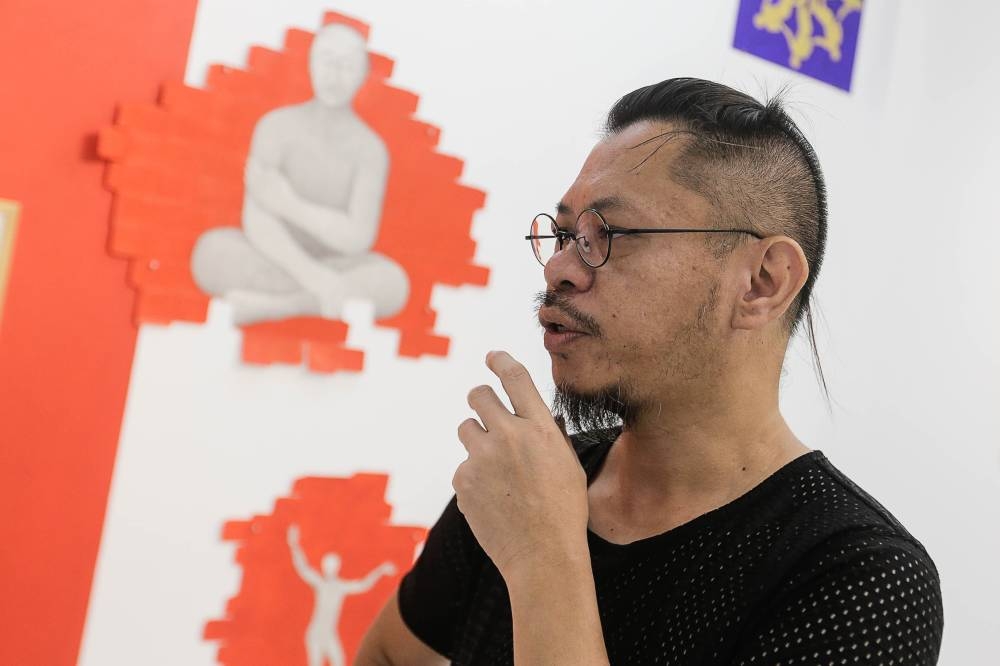Malaysian artist creates dream-like artwork on unusual materials including HIV medication packaging

For artist Jerome Kugan, the use of non-traditional materials in his art was one borne out of necessity (he used HIV medication packaging in some instances).
“I ran out of paper, so I just started using whatever surface I could draw on,” the 47-year-old told Malay Mail.
“It’s also something that came from making collages; I’ve long had an interest in collage art because it improved the way I thought about images.
“Juxtaposing strange things, images that are not supposed to be in the same space, can change the way you look at things.”
This juxtaposition of images and materials can be seen in Jerome’s two-part solo exhibition, HURT NEED UNDO LIVE, currently showing at The Back Room gallery in Kuala Lumpur until Oct 2.
From psychedelic triptychs painted on wooden chopping blocks to ‘talismans’ woven with cigarette packet foil and cardboard, the exhibit is a whimsical explosion of colour and unexpected objects.
Previously known for his writing and music within Kuala Lumpur’s alternative arts scene, Jerome began to pursue art full-time after moving back to his hometown in Kota Kinabalu, Sabah.
While the use of unorthodox materials is a source of inspiration, Jerome is quick to add that the focus should never be on the materials themselves.
“Otherwise it can get too gimmicky, it shouldn’t just be like a recycling project,” he said with a laugh.
“I want the material to have some significance to the work itself – and the work needs to have something to say.”
Giving a voice to the unspoken
An example of a material used in his work that has plenty to say are discarded packages for Efavir, a type of medication used to treat HIV.
The artwork on these packages mainly feature seemingly genderless figures, in scenes of solitude and intimacy, against bold backgrounds of red or gold.
“It’s an ongoing series, so as long as I have the illness, I will continue making this work,” Jerome explained.
“Many of the packages were donated to me by other HIV patients, so I think that made it somewhat less personal and more of a shared experience even if I’ve never met them.
“I don’t know what things are like for them now, but I do know in Malaysia – actually in many parts of the world – there’s still a strong stigma against people who live with HIV/ AIDS.”
When asked if he had fears of being pigeon-holed by creating work about his experience of living with HIV, Jerome simply shrugged and said: “Initially, but I got over it.”
“I think some of that experience comes out in the work in general; the frustration, isolation, and also moments of joy.
“It’s not something that I think about all the time though, so it’s just one part of the many other things I make,” he added.
Art as process of faith
Religious influences also strongly feature throughout the exhibition, as seen in a series of triptychs (artworks divided across three panels) featuring surreal symbols and imagery.
While triptychs themselves were popular in early Christian art, Jerome’s triptychs take on the contrasting colours of Hindu temples and artwork.
Enjoying this article?
Subscribe to get more stories like this delivered to your inbox.
“I’m not really a religious person, but I’m fascinated by rituals, spirituality and faith because these things still influence a lot of people’s lives,” said Jerome.
“So I don’t want to step on people’s faiths by simply borrowing these elements – rather, I use the colours and imagery as inspiration.”
He added that in some way, the artistic process was a leap of faith in itself.
“I mean, art is probably the most useless and least functional thing you could do,” he said.
“At some point, you have to let go of all the questioning over why you’re creating something and give into the process of making it.
“So I think borrowing from religious iconography is my way of acknowledging this leap of faith as an artist.”
For any query with respect to this article or any other content requirement, please contact Editor at [email protected] 2017 Malay Mail Online
Read More News:
Park Min-young admits relationship with rich cryptocurrency businessman but says it’s over now
